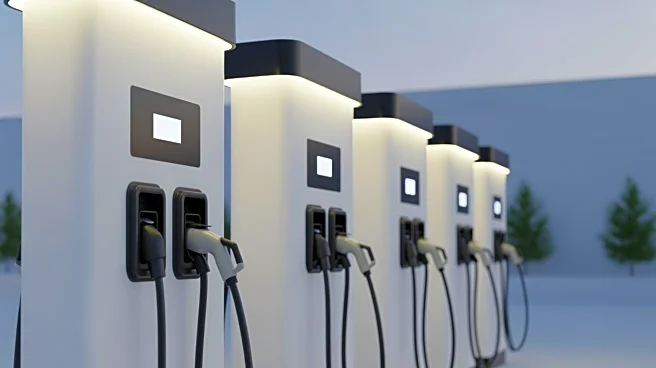What's Happening?
Tesla's electric vehicle sales in Germany have experienced a significant decline, with October 2025 figures showing a drop to 750 units sold, less than half of the 1,607 units sold in the same month the previous
year. This decline is part of a broader trend for Tesla, which has seen a 50% decrease in sales year-to-date, according to data from Germany's federal transport authority, KBA. Despite the overall increase in battery electric vehicle sales in Germany, which rose by nearly 40% year-to-date, Tesla's market share has diminished. The decline in Tesla's sales is attributed to the cessation of government incentives for fully electric vehicles, a policy change that initially led to a drop in demand. However, Germany plans to introduce a new EV incentive program in January 2026 aimed at assisting lower- and middle-income buyers in adopting zero tailpipe emission vehicles.
Why It's Important?
The decline in Tesla's sales in Germany highlights the impact of government policies on the electric vehicle market. The removal of incentives has significantly affected Tesla, despite the overall growth in the EV sector. This situation underscores the importance of government support in promoting the adoption of electric vehicles, particularly for companies like Tesla that rely on such incentives to maintain competitive pricing. The upcoming incentive program could potentially reverse Tesla's fortunes in Germany, but the current decline poses challenges for the company in maintaining its market position. Additionally, Tesla's brand perception in Germany may be influenced by CEO Elon Musk's political endorsements, which could affect consumer preferences.
What's Next?
With the new EV incentive program set to launch in January 2026, Tesla may see a resurgence in sales if the program successfully encourages more consumers to purchase electric vehicles. The program's focus on lower- and middle-income buyers could expand Tesla's customer base if the company can offer competitively priced models. However, Tesla will need to navigate the challenges posed by its current brand perception in Germany and adapt its strategies to align with consumer expectations and government policies. The company's ability to recover its market share will depend on its response to these factors and its capacity to leverage the new incentives effectively.










